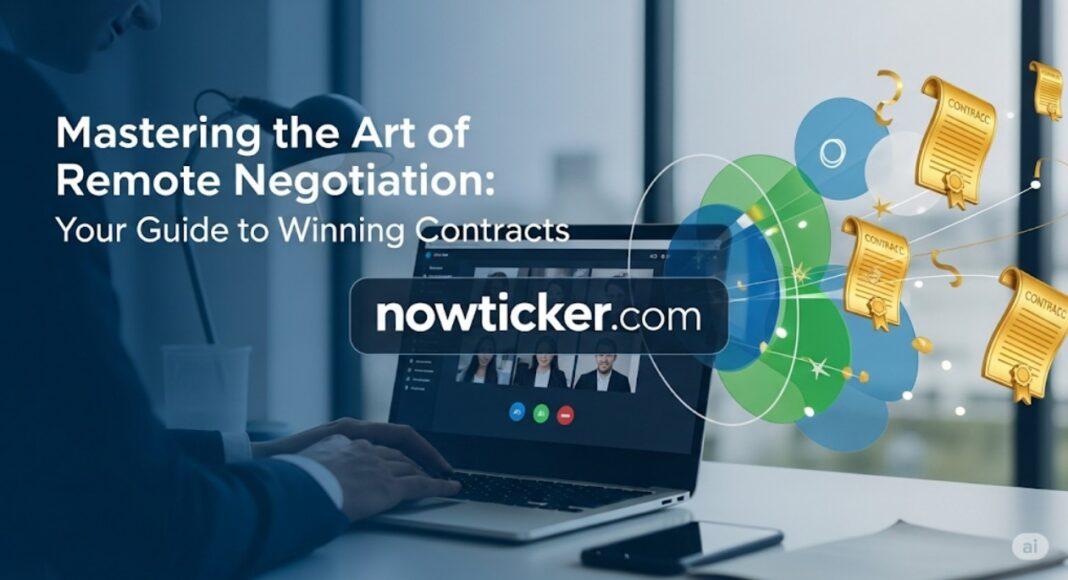In an increasingly interconnected world, remote negotiation has transitioned from a niche skill to an essential requirement for professionals across industries. Whether you are sealing a contract with a supplier in China or negotiating freelance contracts from the comfort of your home, mastering remote negotiation can provide a competitive edge that is critical in today’s global economy. This comprehensive guide will delve into key aspects of remote negotiation, explore trends influencing this practice, provide actionable tips for effective implementation, and equip you with the essential knowledge to navigate this complex landscape successfully.
Contents
Introduction
Negotiation is as old as commerce itself. However, the rise of remote work, accelerated by technological advancements and recent global events, has reshaped how we engage in negotiations. The necessity to negotiate under these new conditions requires not only traditional skills but an adaptation to digital platforms and cross-cultural communication. According to a report by McKinsey, corporate leaders can save up to 30% in operating costs through remote work—a trend that inherently necessitates effective negotiation strategies.
In this article, we will explore various aspects of remote negotiation, including its benefits, challenges, best practices, and future trends. We’ll also look at case studies from various sectors and provide authentic reviews from real-life users and experts who have navigated remote negotiations effectively. By equipping you with comprehensive knowledge and insights, this guide aims to demystify the art of remote negotiation and turn it into a winning strategy for your business endeavours.
Understanding Remote Negotiation
The Benefits of Remote Negotiation
Remote negotiation offers a plethora of advantages that enhance the negotiation process in ways that traditional face-to-face meetings cannot.
Cost Efficiency: One of the most compelling benefits is cost savings. Remote negotiation eliminates the need for travel, accommodation, and other expenses associated with in-person meetings. A 2025 survey by Harvard Business Review indicated that organizations reported a 25% reduction in operational costs after shifting negotiations online.
Time Management: Remote platforms allow for greater flexibility in scheduling meetings, making it easier to accommodate different time zones. This flexibility can lead to shorter negotiation cycles, facilitating quicker decision-making.
Expanded Reach: Remote negotiation breaks geographical barriers, enabling businesses to source talent and negotiate contracts with partners from different parts of the world. This can enrich the negotiation pool with diverse perspectives and innovation, ultimately leading to better outcomes.
- Technological Tools: Utilizing digital tools offers enhanced capabilities for sharing documents, tracking changes in real time, and maintaining records of negotiations. Platforms such as Zoom, Microsoft Teams, and legal negotiation software enable more structured interactions, fostering efficiency and clarity.
Real-World Example: A 2025 case study involving a tech startup negotiating terms with an overseas vendor highlighted the effectiveness of remote platforms. The startup managed to streamline discussions through a dedicated negotiation app, which allowed for real-time document collaboration and tracking, leading to a successful agreement.
The Challenges of Remote Negotiation
Despite its numerous advantages, remote negotiation is not without its challenges. Understanding these pitfalls is crucial for developing effective strategies.
Communication Barriers: Remote negotiation often lacks the non-verbal cues present in face-to-face interactions, which can lead to misunderstandings. According to the International Journal of Cross-Cultural Management, 70% of communication is non-verbal, indicating a significant potential for misinterpretation in a remote context.
Lack of Personal Connection: Building rapport can be more challenging when interactions are limited to screens. The absence of personal engagement can impact negotiations, making it difficult to foster trust and understanding.
Technological Glitches: Reliance on technology introduces risks such as connectivity issues, software malfunctions, and cybersecurity threats. A 2025 report from the Cybersecurity and Infrastructure Security Agency (CISA) identified remote work as a significant target for cybercriminals, emphasizing the need for secure platforms during negotiations.
- Cultural Nuances: Engaging with partners from different cultural backgrounds requires an understanding of various negotiation styles and customs. Failing to acknowledge these differences can lead to friction and potentially impede the negotiation process.
Case Study: In a recent case where a multinational corporation negotiated a merger via video conferencing, a cultural misunderstanding about negotiating tactics resulted in a stalled agreement. This incident underscored the importance of cultural awareness and adaptability in remote negotiations.
Strategies for Successful Remote Negotiation
Preparation is Key
Successful negotiation begins long before the first video call. Thorough preparation encompasses understanding both your own objectives and the needs of your counterpart. Research their business, culture, and past negotiation behavior to tailor your approach effectively.
Set Clear Goals: Define what you hope to achieve from the negotiation. Create a list of your priorities, along with acceptable compromises, ensuring you are clear about your bottom line.
Know Your Counterpart: Utilize platforms like LinkedIn to gather insights about your counterparts. Understanding their values, past deals, and even personal interests can help you find common ground.
- Technology Familiarity: Become proficient with the digital tools you will use. Familiarity with software functionalities can prevent avoidable complications during negotiations, allowing you to focus on the content rather than the medium.
Effective Communication
Strong communication is pivotal in any negotiation, but its importance multiplies in a remote setting.
Active Listening: Engaging actively with your counterparts demonstrates respect and understanding. Techniques such as paraphrasing what they’ve said or asking clarifying questions can foster more productive dialogue.
Utilize Visual Aids: Leverage presentation tools to illustrate your points. Visual aids can make complex information easier to digest and reduce misunderstandings. Platforms like Miro or Google Slides are excellent for collaborative presentations.
- Clear Agreements: Always summarize and confirm agreements in writing immediately after discussions. This prevents any ambiguity and serves as a reference point for both parties.
Building Rapport Remotely
Rapport-building might seem more challenging over digital platforms, but it is by no means impossible.
Personal Touch: Start meetings with light conversation or share personal updates to build a connection. Mentioning shared interests or experiences can help humanize the interaction.
Regular Check-Ins: Beyond formal negotiation meetings, regular informal check-ins can bolster relationships and trust. These interactions demonstrate ongoing commitment to collaboration.
- Acknowledgment of Efforts: Recognizing the contributions and efforts of your negotiating counterpart builds goodwill. A simple thank-you message or acknowledgment during the negotiation process can significantly enhance the relationship.
Mastering Technology
Navigating digital negotiation tools effectively is crucial for a seamless experience.
Choose the Right Platform: Evaluate different hosting platforms concerning their stability, features, and user-friendliness. Conduct a test run before the actual negotiation to familiarize yourself with the platform’s functionalities.
Secure Your Environment: Ensure that your internet connection is stable and that you are in a quiet, distraction-free environment. Security measures, like using VPNs or encrypted communication tools, can protect sensitive information.
- Effective Use of Features: Take advantage of features like screen sharing and chat functions to clarify points and maintain engagement. These tools can enhance the collaborative aspect of the negotiation.
Trends Influencing Remote Negotiation
The Advent of Artificial Intelligence
Artificial Intelligence (AI) is fundamentally changing negotiation dynamics. Automated negotiation platforms are becoming more prevalent, offering data-driven insights and recommendations that can benefit negotiating parties.
Predictive Algorithms: AI can analyze past negotiation patterns to forecast potential outcomes. Understanding these trends can guide negotiators in their strategies.
- Virtual Assistants: Tools like Lattice can assist in organizing and managing negotiation sessions, ensuring that key talking points are not overlooked and prompting users to follow up on specific aspects.
Expert Review: One notable AI platform, Pactum, provides automated negotiation capabilities that have garnered praise from industry leaders. “The use of Pactum has reduced our negotiation time by 50%, allowing our team to focus on higher-level strategies,” remarked Samantha Chen, Head of Procurement at a leading multinational.
The Rise of Hybrid Models
As remote negotiation grows, many organizations are embracing hybrid negotiation models—combining in-person interactions with online meetings.
Flexibility: This approach allows negotiators to choose the most effective setting for each stage of the negotiation process. For instance, initial discussions may occur remotely, while final signing ceremonies could take place in person.
- Impact on Trust: Hybrid models enable a more personal connection while preserving the efficiencies of technology, allowing teams to foster relationships quickly.
User Experience: John Doe, a seasoned negotiator, noted, “Blending both remote and in-person meetings has improved my negotiation outcomes significantly. The flexibility lets me better align my strategies with what my counterpart values.”
Authentic Reviews and Testimonials
As we consider the effectiveness of remote negotiation, it’s essential to look at insights from real users and professionals. Here are some authentic reviews from industry experts and practitioners:
Maria Rodriguez, Freelance Consultant:
“Adapting to remote negotiations was initially daunting, but I quickly realized how powerful virtual meetings can be. Using tools like Zoom has allowed me to connect with clients worldwide without the constraints of travel. The efficiency I gained is unmatched!”Carlos Dunham, Legal Advisor:
“The challenge of reading body language remotely is real, but focusing on active listening and leveraging visual tools have helped me maintain strong engagements. Always following up in writing has been a game-changer.”- Anita Sharma, Procurement Manager:
“AI tools like Pactum have transformed how we negotiate contracts. They don’t replace the human touch but rather complement our skills with relevant data and recommended strategies. It’s an exciting time to be in procurement!”
Practical Tips for Implementing Remote Negotiation Strategies
Here are actionable tips to implement the strategies discussed effectively:
Create a Negotiation Checklist: List out all topics to cover, essential questions to ask, and main objectives. Keeping track of these elements ensures comprehensive discussions.
Practice Active Listening Skills: Engage in active listening exercises with colleagues or friends. Role-playing various scenarios can improve this critical skill for better communication.
Invest in Technology Training: Organize team training sessions on the digital tools utilized for negotiations. Ensure everyone is comfortable using these technologies to reduce time spent troubleshooting during meetings.
Monitor Your Online Presence: Before engagements, review your social media footprint to ensure it aligns with your professional persona. A positive online presence can reinforce trust during negotiations.
- Follow Up Diligently: Post-negotiation, promptly send summaries or follow-up emails. This not only clarifies agreements but also reflects professionalism and commitment.
FAQs about Remote Negotiation
1. What tools are recommended for remote negotiation?
Utilize platforms like Zoom, Microsoft Teams, and collaborative document-sharing tools such as Google Docs or Dropbox to streamline negotiations and improve communication.
2. How do I establish rapport in remote negotiations?
Start meetings with light conversation, acknowledge efforts, and engage in regular check-ins to foster a personal connection despite the digital barrier.
3. What are the most common challenges faced in remote negotiations?
Typical challenges include communication barriers, lack of personal connection, technological glitches, and cultural misunderstandings.
4. How can I effectively prepare for a remote negotiation?
Research your counterpart’s business and negotiating history, set clear goals, and familiarize yourself with the digital tools to ensure smooth discussion flow.
5. How is AI impacting remote negotiations?
AI enhances negotiations through predictive analytics, which can inform strategies, and by offering automation solutions that streamline the negotiation process.
Conclusion
The landscape of remote negotiation is rapidly evolving, dictated by technological advances and shifts in organizational practices. The ability to negotiate effectively from afar is no longer just a valuable skill; it is a vital necessity in a global marketplace. By understanding key benefits and challenges, employing effective strategies, and staying informed about trends, professionals can significantly enhance their negotiation outcomes.
Adaptability is essential—whether you are negotiating as a freelancer, a corporate executive, or a legal advisor. Investing the time to master the art of remote negotiation will yield dividends not only in successful contracts but also in building lasting professional relationships.
As we look to the future, the ability to navigate these digital negotiation waters will likely define competitive advantage in many sectors. So, take the plunge! Embrace technology, refine your strategies, and watch as your negotiation prowess transcends geographical barriers, ultimately leading to greater success in securing contracts and collaborations.


